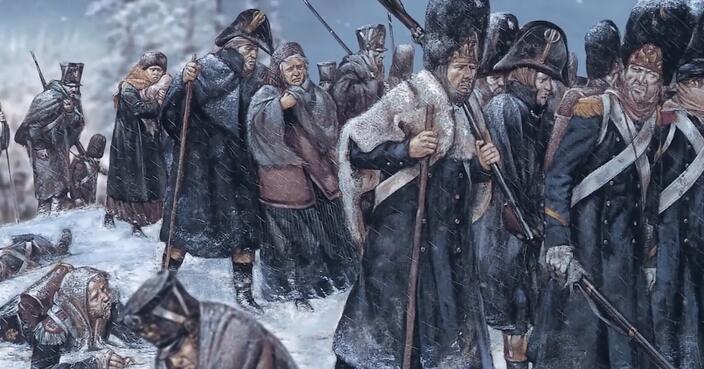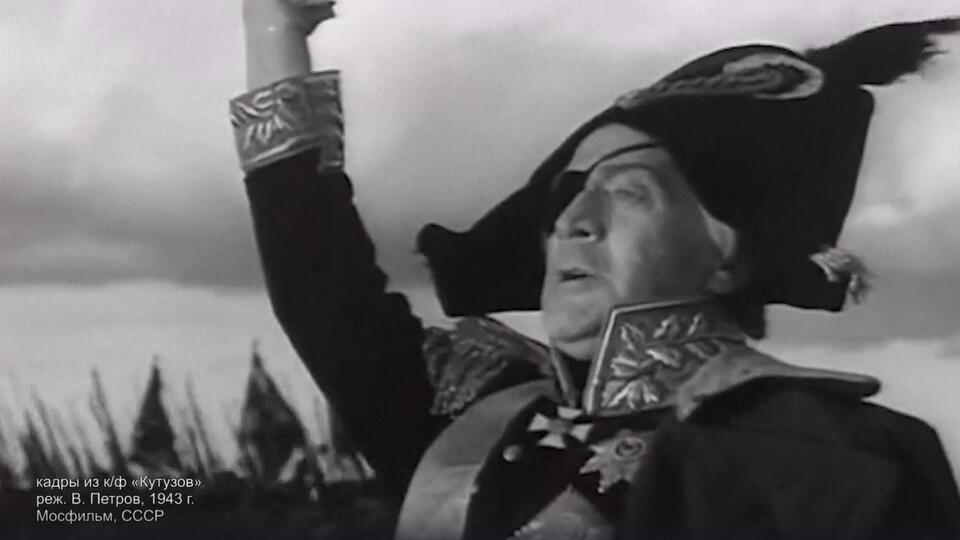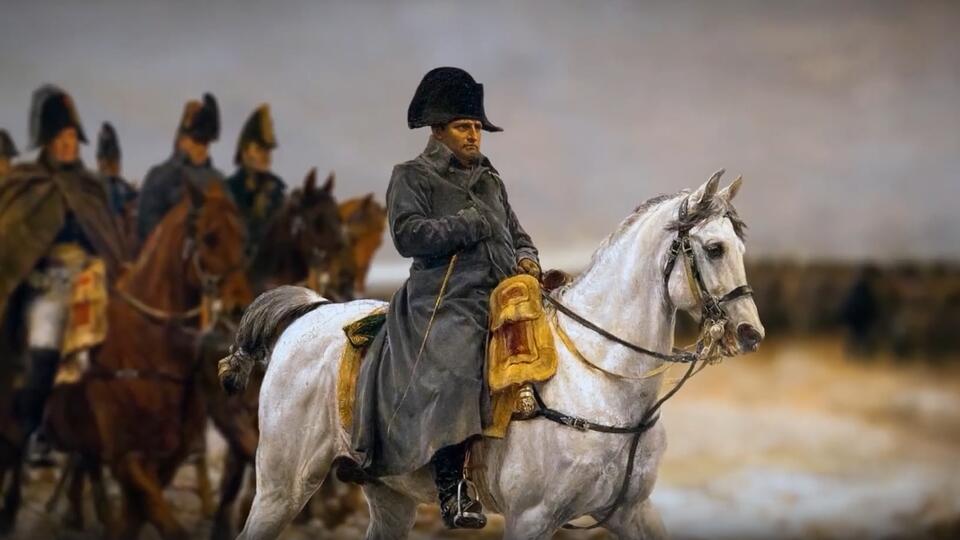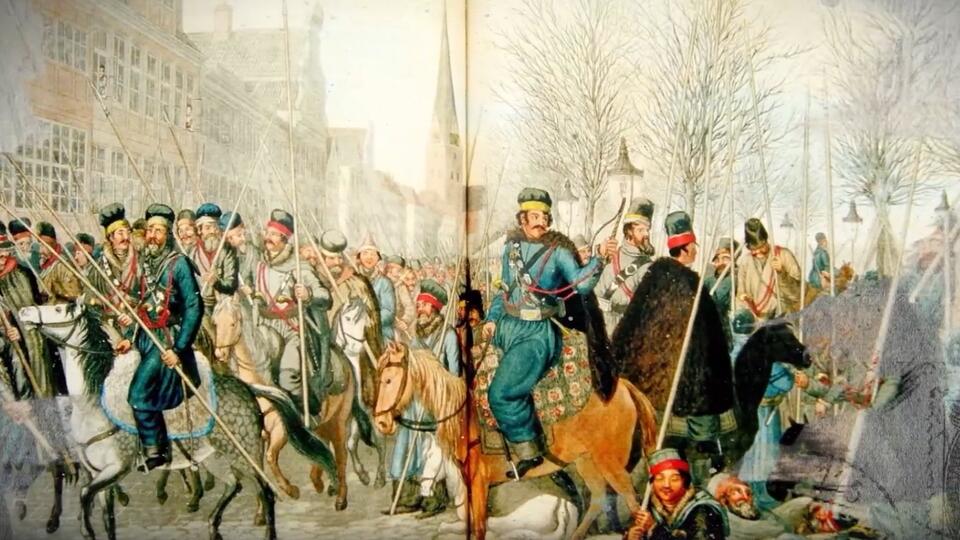Photo: © Video screenshot
“I will create a new army of 300 thousand people, at the head of which I will become next spring and defeat the Muscovites!” This is what Napoleon said when he returned to Paris on December 18, 1812. And he kept his promise. His army in a few months dealt heavy blows to the groupings of the Russian and Prussian armies. Nevertheless, this did not save from defeat – in the spring of 1814, the Allies stormed the capital of France. Where did Napoleon Bonaparte miscalculate? And how did the life of the Parisians change when the army of Alexander I entered the city? Talks about it program “Unknown History” on REN TV.
plight
In October 1812, in the battle near the village of Tarutino, Russian troops defeated the corps of Marshal Murat. After the defeat, the French army began to leave Moscow. On November 8, Napoleon entered Smolensk, where he expected to spend the winter, but the food warehouses had already been plundered by the French units that had entered the city earlier. The emperor had to move towards Minsk – to a new wintering place.
“When he left Smolensk near the village of Krasnoye, Kutuzov gave him a battle. And Napoleon’s losses in this battle amounted to several thousand people and many artillery pieces. And Kutuzov’s losses amounted to only 500 people. That is, here the strategy of exhaustion, it manifested itself in full under Red, – said Ivan Anfertiev, Doctor of Historical Sciences, Professor of the Russian State Humanitarian University.
But the main catastrophe awaited Napoleon’s army near the Berezina River. The Russians blew up the only bridge, the French soldiers had to build pontoons from logs, standing in icy water. A crowd of forty thousand gathered at the crossing.
“When the Russian troops began to shell this place, this whole crowd rushed to the bridges. One of the bridges collapsed, on the other there was a huge crowd, crowding. As a result, the French were forced to make their way through these bridges by force, in fact, throw these unfortunate compatriots into the river ,” – says the archivist historian, author of a book about the era of Napoleon Igor Bordachenkov.
When crossing the Berezina, Napoleon lost about twenty-five thousand people – captured, wounded, killed and drowned. And the Russian frosts hit the survivors with all their might.
Escape to Paris
The French were indeed in distress. Because of the famine, cannibalism even began in their ranks. In early December, Napoleon handed over the command of the defeated army to Murat and secretly departed for Paris. The emperor blamed the failure exclusively on the Russian winter, although the troops of Alexander I fought in the same weather conditions.

“He just fled, leaving the army, the generals, the wounded. He rushed to Paris, because he understood that a little more, and he would simply be overthrown,” – said the historian, sociologist, senior lecturer at Moscow State Pedagogical University Yuri Moskovsky.
Returning home, Napoleon immediately began to collect a new army. Kutuzov had no particular desire to fight outside of Russia, but for Alexander I, the defeat of Bonaparte became a personal matter. The emperor used to say: “Either Napoleon or me – together we cannot reign!” In January 1813, the foreign campaign of the Russian army began: the troops under the command of Kutuzov crossed the Neman.
“Kutuzov turned to the troops. The meaning of his speech was this: Napoleon’s army robbed, burned crops, insulted our shrines. And for this the Lord punished the French army. We should not behave like this. We are the Russian army, the Russian army and must behave accordingly And then the Lord will reward us with victory,” says the historian.
Re-defeat
In the Polish city of Kalesh on February 27, a Russian-Prussian alliance treaty was officially concluded. And two months later – on April 28, Kutuzov died after a long illness.

“Alexander I spent the last days of Kutuzov’s life with him. Of course, this loss of the commander played a big role in the further actions of the Russian army,” Bordachenkov said.
Meanwhile, Bonaparte gathered 180 thousand soldiers – almost twice as many as the Russo-Prussian coalition. The decisive moment came in October 1813: the largest battle of the 19th century, known as the “Battle of the Nations”, took place near Leipzig. In four days, the Allies lost 54 thousand people killed and wounded, the French – up to 80 thousand. Moreover, the retreating army of Napoleon suffered the same misfortune as on the Berezina.
“There was an accident. The French accidentally blew up the bridge across the river, this cut off two French corps from the retreat. This caused heavy losses in the French army. And this greatly affected morale. If the guards still held out, then the rest of the units began to scatter, in fact, ” says the expert.
Russian triumph in Paris
Bonaparte again began to collect an army of untrained recruits and even tried to organize a partisan movement in France following the example of the Russians. But all in vain – after a series of battles, the allied army cleared the way to Paris.

“Russian troops approached the city on March 30, 1814. The French defended themselves bravely, but numerical superiority made it possible for the Russian troops to occupy the dominant heights of Montmartre,” – said the historian.
After bloody battles in which the Russians lost more than 6,000 people, Paris surrendered. On March 31, the Allied army in full dress, with drumming and banners triumphantly entered the city.
“In Paris, a proclamation was circulated that the inhabitants were not in danger. And crowds of Parisians rushed to the northeast of Paris, from where the Russian troops led by the emperor entered. Legend has it that one of the Parisians approached Alexander and said, they say, but we have been waiting for you for a long time.” To which Alexander replied: “Of course, I would have come earlier. But I was delayed by the courage of your troops,” Moskovsky said.
The entry of the Russians into the city is shrouded in many legends. Parisian women allegedly enthusiastically jumped on the saddles to the cavalrymen. The Cossacks swam naked in the Seine with their horses, and the camels brought to the city by the Kalmyks frightened the impressionable young ladies. But the truth is that most Parisians did greet the Russians with a standing ovation.
“In Paris at that time there were quite a lot of people who shared royalist convictions. They were opponents of Napoleon’s power. They met the allied troops with great enthusiasm. In Alexander I they saw some enlightened monarch who would bring peace to the country and the restoration of the throne of Louis XVIII, ” Bordachenkov said.
How the Russian Count Saved Napoleon
The royalists even demolished the statue of Napoleon from the Vendôme column, and on April 6 the deposed emperor was forced to abdicate for himself and his son. Bonaparte was sent under escort to an honorary exile on the island of Elba in the Mediterranean. The path lay through the Provencal villages, whose inhabitants were hostile to the former emperor. The crowd screamed and threw sewage into his carriage. Count Pavel Shuvalov, who accompanied Napoleon, realized that things were bad. He transferred him to his carriage and borrowed an overcoat for disguise.

“Napoleon asked where such nobility came from. Shuvalov said: “The Emperor ordered that you be delivered to the island of Elba safe and sound. I will carry out his order. “He arrived safely at the Elbe. By the way, he presented Shuvalov with his famous saber, which he received for a trip to Egypt in 1798. Now this saber is in one of our museums,” Moskovsky says.
How the life of the Parisians has changed
Meanwhile, Allied troops remained in Paris. The Cossacks set up camp on the Champs Elysees, which at that time were deserted meadows. Russian soldiers lit fires and cooked food bought from local merchants. They did not rob or loot – everyone was paid a salary for three years.
“Alexander I was strictly indicated: in no case loot. I do not know if there were cases of execution, but before the execution, threats were announced. That anyone will be seen in theft, looting, molesting the inhabitants of Paris and so on, the most cruel measures will be taken, ” the historian said.
Russians willingly reveled in Parisian taverns, and many legends are associated with these. It is believed that the word “bistro” comes from the cry “Quickly!” But this is not so: the concept of “bistro” appeared much later – at the end of the 19th century. And most likely this is a derivative of the French word “bistouille” (bistouille), which means “swill”. By the way, the Russian tradition of clearing empty bottles from the table allegedly also originated in Paris.

“According to French standards, it was not immediately paid after the bottles were brought, but after the evening was over. Here the servant came, counted how many bottles a person had left on the table, and calculated how much to pay for all this. Naturally, our Cossacks immediately realized that if you put the bottle under the table drunk, you can save, “ – said Bordachenkov.
As a result, the Russian soldiers spent two months in Paris and parted amicably with the French. Louis XVIII settled on the throne, a peace treaty was signed, and in early June the allies left the French capital. But the matter did not end there. In 1815, the Russian army had to re-enter Paris and stay there for almost three years. This was preceded by the flight of Napoleon from Elba. He returned to the capital with a small but brave army. Finally, Bonaparte was defeated at the Battle of Waterloo and sent into exile on the island of St. Helena, from where he never returned.
The most mysterious and interesting places on our planet, the amazing customs of peoples, incredible stories and much more – in the program “Unknown History” with Timofey Bazhenov on REN TV.
Source: Ren
Ray Bly is an accomplished journalist in the field of Automobile. He currently works as a writer at 24 news breaker. With a deep understanding of the Automotive industry and a talent for uncovering the latest developments, Ray’s writing provides readers with insightful and informative coverage of the latest news and trends in the field.
